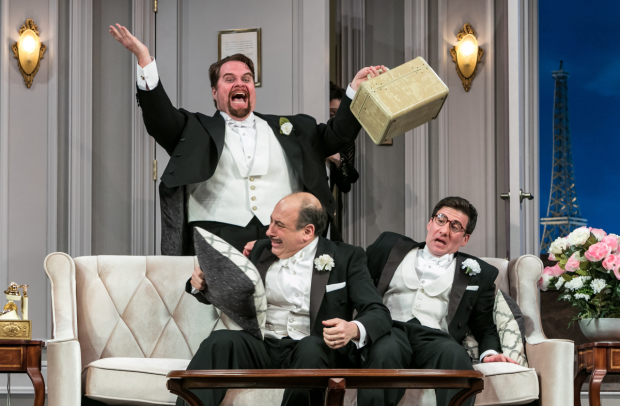A Comedy of Tenors

(© Jerry Dalia)
One of the beautiful things about theater is its ability to open minds to new ideas, experiences, and world views. One of the other fine qualities of the stage is its ability to close up shop on all of that tiresome business for a minimum of two hours. The Paper Mill Playhouse production of Ken Ludwig's A Comedy of Tenors — staying true to the spirit of its predecessor, Lend Me a Tenor — delivers a blissfully mindless romp that demands absolutely no mental or emotional effort. And if that's what your exhausted, news-absorbing brain is in the market for, prepare yourself for 120 minutes of idiotic bliss.
Reuniting the players from Paper Mill's 2013 production of Lend Me a Tenor, A Comedy of Tenors (which premiered in a 2015 coproduction with Cleveland Play House and McCarter Theatre) brings most of them back to their former characters a few steps along on their journeys. Max (David Josefsberg), who we last saw launch his opera career while winning the heart of Maggie Saunders — daughter of his boss Henry (Michael Kostroff) — is now days away from expecting his first child. In the meantime, he and his frazzled boss-cum-father-in-law are away in Paris putting the finishing touches on a high-profile concert in which Max will be appearing alongside opera superstar Tito Merelli (John Treacy Egan). When the third tenor slated to round out the bill cancels at the last minute, Saunders recruits opera adonis Carlo (Ryan Silverman) to fill the slot. He unfortunately does so after Tito convinces himself that Carlo is having a torrid affair with his sharp-tongued wife, Maria (a comically inspired Judy Blazer) — a misunderstanding that's set in motion after Maria finds Carlo in his skivvies with her daughter Mimi (Jill Paice). The beautiful soprano Racón (Donna English) completes the ensemble as the woman who later tries to lure Tito into bed (though she unknowingly seduces a Tito doppelgänger instead).
Under Don Stephenson's meticulous direction, chase scenes, mistaken identities, and carefully choreographed door-slamming ensue in the familiar way of sex farces. On the traditional canvas of a luxurious hotel suite (given fine design by Michael Schweikardt), Ludwig colors distinctly inside the lines of the tried-and-true formula of outlandish misunderstandings that end with love, marriage, and general happiness for one and all. Joined by clever wordplay and a collection of sight gags (most revolving around a giant tongue that's the centerpiece of an elaborate food spread), the recipe proves dependable for plenty of chuckles, but not guffaws. It's two acts of bizarre twists and turns, but nothing ever veers into new or surprising comic territory.
Though not groundbreaking, the solidly structured play does make for a smooth and pleasant ride, led by a trusty band of expert rompers — a lascivious group of emotional infants ironically donning the fine garments of the social elite (a collection of dramatic gowns and tailored tuxedos designed by Mariah Hale). Egan is larger than life with a voice to match as Tito, a Pavarotti-esque buffoon. Blazer in turn plays his feisty Italian wife with a commitment that's unmatched by any of her costars — though Paice and Silverman (who also gets to show off his beautiful tenor voice) do take on the admirable task of performing much of Act 1 in their undergarments. Kostroff and Josefsberg also make an excellent comic pair, assuming a rapport as delightfully acidic as the one they developed for their respective turns as Max Bialystock and Leo Bloom in Paper Mill's production of The Producers earlier this season.
They're all good people behaving…not badly, but certainly questionably. So while we can gawk at their foibles, jealousies, and missteps, we have complete permission to rejoice in all their predictable victories. And in a world in desperate need of unfettered celebration, that's a relief.











